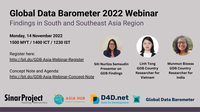Global Data Barometer 2022 Webinar
- When Nov 14, 2022 from 03:00 PM to 04:00 PM (Asia/Shanghai / UTC800)
- Where Online
- Contact Name Siti Nurliza Samsudin
- Web Visit external website
-
Add event to calendar
iCal
Asia is a populous and diverse region, with different languages, cultures, forms of government, levels of economic development, and varying political context even within sub-regions. Politically, there is a great degree of variability in the Asia region, which has one-party states and multi-party states, military rule, constitutional monarchies, republics and federations, and independent regions. Economically, there exists enormous variation in GNI per capita, urban-rural population ratio, composition of GDP and openness to trade.
Ultimately, these political and economic factors would influence their respective governments in policy decisions. While the data agenda has risen in global and national policies including in Asia, the progress towards effective data governance, and to realizing the public value of data, remains highly uneven, consistent with the diversity of the political and economic environment. Data ecosystems, which consist of policies, laws, standards, and technologies are influenced by available resources allocated by institutions based on their priorities in resolving data issues such as cybersecurity, data privacy, data management and open data. Additionally, key actors in these institutions may be limited by the policy-regulatory framework which are typically complex in any government in Asia. Building on the Open Data Barometer, which has been used to drive policymaking, advocacy, and academic research around the world, the Global Data Barometer asks the question: To what extent are countries managing data for the public good
The Global Data Barometer Country profiles, provides a quick overview of the strengths and weaknesses for several countries in Asia with regards to data capabilities, governance, availability and impact, and in comparison with other countries in the region and globally. It also provides an overview of the data ecosystem of each country. The country profiles are derived from data and research from the Global Data Barometer 2022 First Edition.
This webinar aims to present findings from 11 countries in the region, as well as to discuss the findings and potential next steps with the country researchers involved in the survey.
Agenda
Date: 14 November 2022 (Monday)
Time:1500-1600 MYT / Other time zones: https://www.inyourowntime.zone/2022-11-14_15.00_Asia.Kuala_Lumpur
Platform: Google Meet
Registration link: http://bit.do/GDB-Asia-Webinar-Register
|
Time |
Item |
Speaker |
|---|---|---|
|
1500 - 1505 (5 minutes) |
Introduction |
Khairil (Coordinator and Executive Director, Sinar Project) |
|
1505 - 1520 (15 minutes) |
Presentation on GDB Findings in 11 countries in South and Southeast Asia |
Siti Nurliza (Technologist, Sinar Project) |
|
1520 - 1540 (20 minutes) |
Highlights on findings, as well as feedback on the report |
|
|
1540 - 1600 (20 minutes) |
Q&A session |
- |
About Global Data Barometer
The Global Data Barometer (GDB) is the result of the efforts of over 100 researchers and a network of regional research hubs around the world. The design of the GDB builds on the previous editions of the Open Data Barometer, but takes a broader look at data sharing and use for the public good, including giving additional attention to issues of privacy and inclusion.
The Barometer is a multi-dimensional and multi-layered study that assessed the state of data for public good in 109 countries. An expert survey was conducted from May 2019 – May 2021 to create a new global benchmark that looks at data governance, capability, availability, and use and impact of data for public good. The GDB full report and datasets of the GDB are available on their website.
Researchers in Asia were engaged in collaboration with the Data for Development AsiaHub (https://od4dasiahub.org/) to provide a new benchmark and the essential data needed to drive a fuller understanding of the state of data for development, open data implementation, and data justice in Asia.

